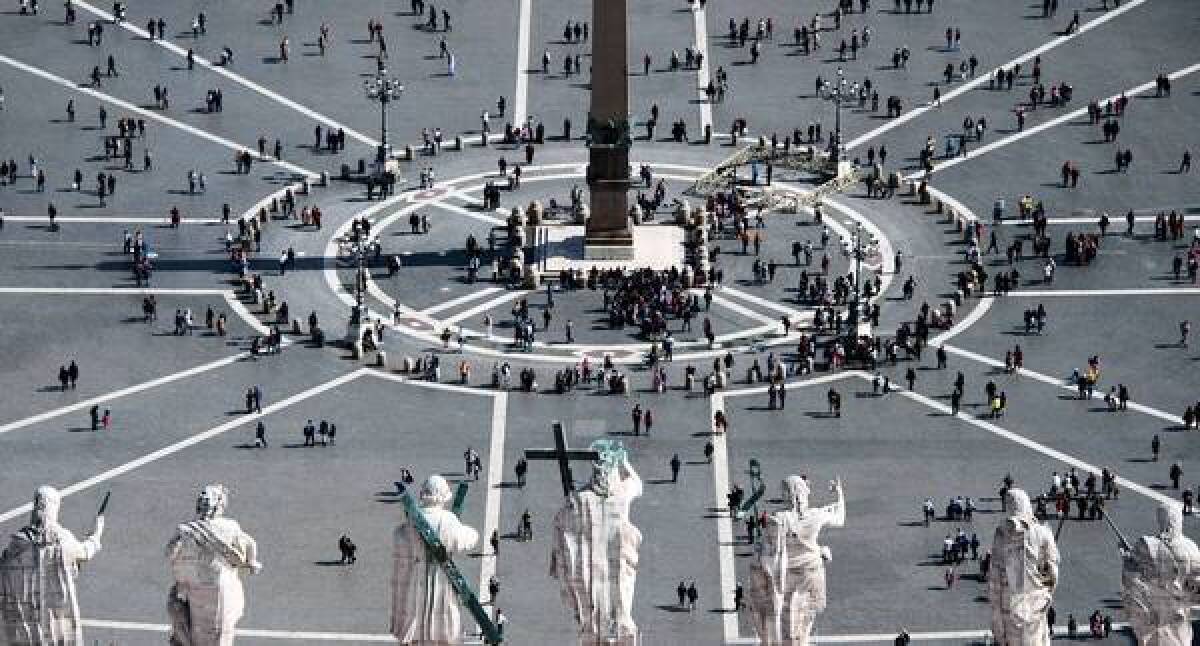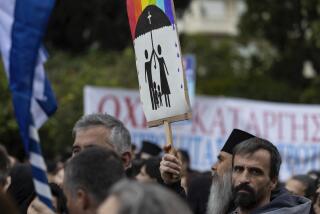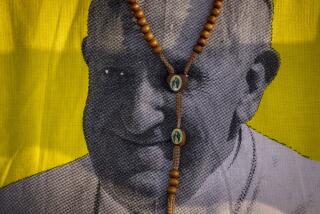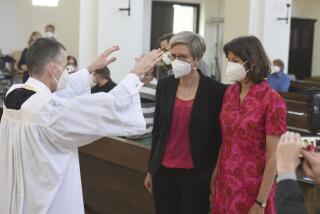Roman Catholic Church feels Europe slipping from its hands

- Share via
VATICAN CITY — The timing said it all.
A smiling Pope Benedict XVI had just wrapped up an official visit to Portugal in May 2010, during which he praised Catholic organizations striving to protect families based on “the indissoluble marriage between a man and a woman.”
But barely 72 hours after the pontiff flew home, the president of Portugal declared that he would sign a bill allowing gay and lesbian couples to wed. With Spain having granted such rights five years earlier, the move turned the entire Iberian Peninsula, historically a Catholic stronghold, into an unlikely hitching post for homosexuals.
Choosing a new pope: Full coverage of the papal conclave
“That shows the importance of the pope’s views, of the Catholic Church’s views, on same-sex marriage in terms of domestic politics,” Paulo Corte-Real, a gay rights activist and economics professor, recalled wryly.
More than just an embarrassment, the turn of events was emblematic of the fact that the Roman Catholic Church, once a mighty force on its home continent, is weaker in modern Europe than ever before, its influence ebbing, its privileged status increasingly called into question.
The now-retired Benedict spent much of his eight-year papacy trying to revive Catholicism here on its home turf. But the cardinals now assembled at the Vatican to pick his successor face a grim reality: The campaign has failed to reverse, or even just to halt, Europe’s slide toward what church leaders regard as godless humanism.
Empty spaces in the pews abound. The clerical sex-abuse scandal has stripped the church of much of its credibility and moral authority in parts of Europe (and the United States as well). When it comes to high-profile social issues such as gay rights and abortion, the church has lost battle after battle.
For many Europeans, the relevance of the church, both for their personal and their public lives, is a thing of the past.
“The modern world and the Catholic Church are out of step,” said Clifford Longley, a Catholic columnist and analyst in Britain. “The Catholic Church can try to re-evangelize by getting the modern world back into step with it, but I don’t think that’s going to work.”
The church’s declining fortunes in Europe pose tough choices to the cardinals gathering in their secretive conclave. Should they maintain the emphasis on shoring up the faith in the Vatican’s backyard, or concentrate and increase their resources in places where the church is actually growing, such as Africa and Asia? Should they take an even more dramatic step (and a deep breath) and elect a new pope from one of those regions?
PHOTOS: Pope Benedict XVI’s resignation
No clear favorite has emerged, at least in public discourse. But the composition of the College of Cardinals suggests that the new pontiff is more than likely to wind up being a white man in his 60s or 70s with the same conservative, orthodox views on religious doctrine and social issues as Benedict and the late John Paul II.
Europe, by contrast, is steadily becoming more ethnically and religiously heterogeneous and more socially liberal.
That divergence helps explain why, by most every quantitative measure, the Catholic Church has hit hard times in the region.
Weekly Mass attendance is at an all-time low in Western Europe. Only 1 in 5 Catholics in Spain report going to a service once a week. In Germany, it’s 1 in 6, and fewer than 1 in 10 in France, according to research by the Pew Forum on Religion and Public Life.
“I’m Catholic. I was [educated] in a religious school,” said molecular biologist Antonio Garcia, a 33-year-old Spaniard. “But my family never goes to church — only my grandmother.”
In Europe’s biggest countries, the number of baptized Catholics as a share of the overall population has dropped. Indeed, Europe was the only region of the world to witness a decline in the number of Catholics between 1990 and 2010, a period during which the global tally climbed nearly 30% to 1.2 billion adherents, according to Vatican statistics. The proportion of Catholics in Europe was just 23.8% in 2010, the lowest in memory.
The shrinking number of the spiritually devout in Europe has corresponded with a serious loss of temporal clout for the church, an institution that once exercised significant power in alliance with the state or even, in some cases, over and above it.
Catholics and non-Catholics alike have been disillusioned by factors that, critics warn, could fatally undermine the church’s influence if it does not take steps to correct course.
The sex abuse scandal, with its reports of Vatican coverups and insensitive treatment of victims, has robbed the church of its moral standing in the eyes of many. In recent days, the only cardinals in Rome to speak out on the need for the global church to address the issue have been Americans, reinforcing the impression that the church hierarchy in Europe still refuses to acknowledge the severity of the problem.
At the same time, the Vatican’s traditional teachings on family, gender and sexuality no longer seem to connect with the daily experience of many Europeans, who find official Catholic strictures on such matters as birth control and the role of women in the church retrograde and unfair.
To stick to the same dogma risks losing more adherents, said columnist Longley, but change is not on the horizon with the current crop of conservative-leaning cardinals.
“To some extent, they’re prisoners of their own ideology,” Longley said. “The Catholic Church seems so far away from where people are that discussion doesn’t even start.”
Nowhere is the retreat of Catholic influence seen more clearly than in the realm of gay rights.
Catholic leaders have routinely denounced same-sex marriage as a threat to society, organizing demonstrations against it and demanding that lawmakers shun measures to legalize it.
Yet Benedict’s papacy was bookended with major defeats on the issue in countries with large Catholic populations. In 2005, shortly after he was named pope, Spain approved marriage equality, joining nations such as Denmark and Belgium. This year, as Benedict prepared his resignation announcement, both France and Britain introduced bills authorizing same-sex marriage. They are almost certain to become law.
Garcia, the Spanish molecular biologist, is marrying his British boyfriend in September. They’re planning a big bash.
“I have a very conservative family, and I have quite a lot of religious friends. They accept [it] completely,” Garcia said. “Spain is a very Catholic country, but at the same time it’s very progressive.”
No longer the unassailable institution of yore, the church in Spain is even finding its tax-exempt status questioned. Dozens of cash-strapped municipalities have decided to target church-owned properties being used for commercial purposes, not religious ones, and are demanding their share of the revenue.
“The case of a convent where the nuns sell sweets — that’s very typical in Spain. We think that’s an economic activity, for which tax must be paid,” said Anselmo Avendaño, a practicing Catholic and a councilman in Alcala, a town outside Madrid that is $400 million in debt.
In Germany, Benedict’s homeland, local bishops caused a stir last year when, backed by the Vatican, they warned of serious consequences for Catholics who opted out of paying a government-collected tax that goes to the church. Any parishioner who did so would no longer be allowed to take Communion, make confession or serve as a godparent.
Such moves have alienated many of the flock even as Benedict trotted from country to country trying to rejuvenate the faith in Europe.
His visits were met with enthusiasm by many devotees, but the effects often seemed ephemeral. To make Europe a successful mission field, his successor will have to fire up local parishes to take the initiative, said Santiago de la Cierva, a communications professor at the Pontifical University of the Holy Cross in Rome.
“I don’t think the pope alone will make the change,” De la Cierva said. Papal visits are “really important for many Catholic institutions to recover the pride in being Catholic and the enthusiasm for being Catholic. But that alone doesn’t work.”
Special correspondent Lauren Frayer in Alcala, Spain, contributed to this report.
More to Read
Sign up for Essential California
The most important California stories and recommendations in your inbox every morning.
You may occasionally receive promotional content from the Los Angeles Times.











